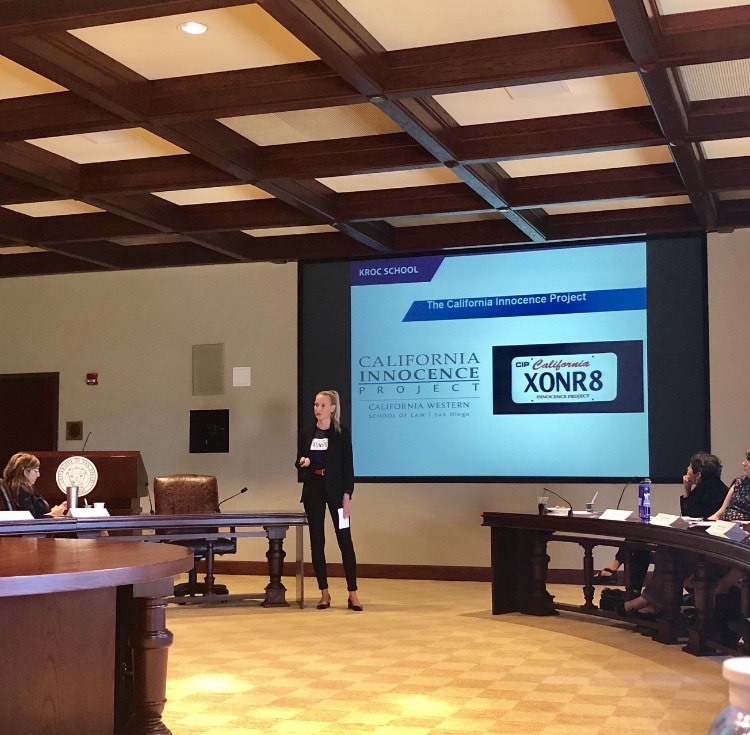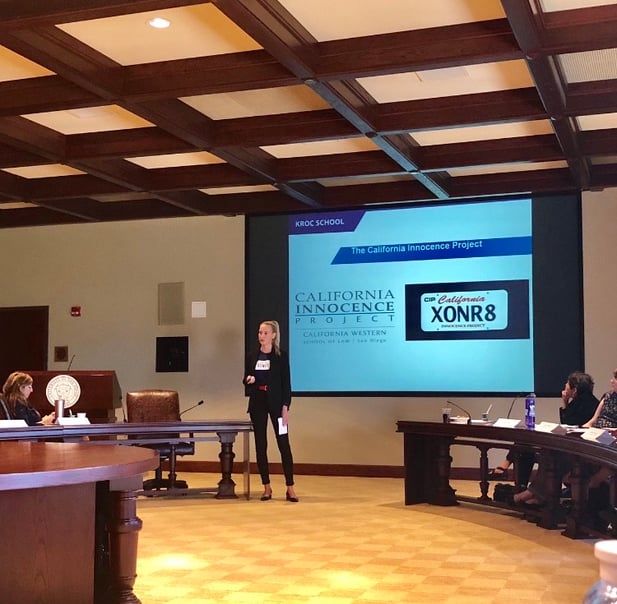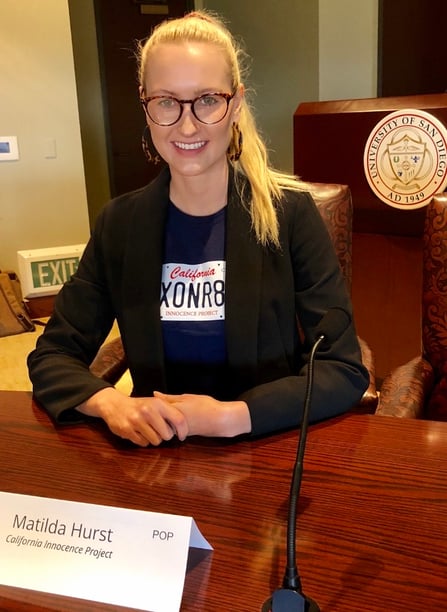How the Kroc School Master’s in Peace and Justice Program Enabled Me to Impact the Criminal Justice System Internationally

How the Kroc School Master’s in Peace and Justice Program Enabled Me to Impact the Criminal Justice System Internationally
begin quoteIf you care, then it really does matter. And remember that one person caring enough to speak, write, or stand up for injustice is what sparked every movement in history.
The following post was written by Master’s in Peace and Justice alumna Matti Hurst.
While growing up in Australia, I developed a strong curiosity in two topics: true crime and Indigenous affairs. I had a particular interest in what drives people to commit crime and whether particular incarcerated individuals had, in fact, committed the crimes of which they were accused — or if they were serving time for a mistake that had been made through the justice system.
In my own backyard of Australia, intergenerational trauma inflicted on Indigenous Australians and motivated by racism made me question the justice system more and more. I realized my white skin came with the privilege of learning about traumatic experiences, and their darker skin came with the disadvantage of having lived them. I decided then and there that I wanted to pursue a career of action and purpose that related to righting this wrong.
A Life-Changing Internship Fuels My Master’s Program Experience
Fast forward 10 years and I found myself pursuing a Master’s in Peace and Justice degree at the Joan B. Kroc School of Peace Studies (Kroc School) at the University of San Diego, studying and gaining a deeper understanding of everything I had ever cared about: human rights, gender equality, justice for those in need, and much more.
A year into my master’s program, I undertook a life-changing internship with the California Innocence Project (CIP), whose mission is to “free the wrongfully convicted from prison, work to reform the criminal justice system, and train law students to become zealous advocates.” For months, I worked alongside CIP staff who gave me incredible insight into the U.S. justice system, plus the vision to see that my final master’s project had the potential to positively impact an important issue in my home country of Australia: the rise of Indigenous female incarceration, particularly in the Northern Territory.

Matti Hurst delivering her final project presentation on CIP
When I commenced my final project for my master’s degree, I had moments of self-doubt and feeling overwhelmed, but my passion for the subject never waned. I threw myself into the research and as I did, my seed of an idea started to grow. With the resources available to me through the master’s program, my research skills improved tremendously. As I gathered the data and my paper began to have a structure, I knew I was on the right path to making an impact on an issue I cared deeply about.
One of the best parts of working on my final project was having the honor to work closely with Professor Dustin Sharp, PhD. He shared his wisdom freely and enthusiastically, and he helped guide me through the process in the most encouraging way. I am so thankful to him for his constructive feedback and support which enabled me to turn my final project into something that would propel me in my career and also become a valuable resource for countless others.
My Dream Comes True: My Final Project Gets Picked up by a Prominent Justice Org, and Another Big Peacebuilding Opportunity Comes My Way
Even far-fetched dreams can become reality if you care enough and have the support of inspiring, knowledgeable Kroc School professors like Dr. Dustin Sharp. Upon completion of my final project, I shared it with the preeminent Indigenous legal agency in the Northern Territory, The North Australian Aboriginal Justice Agency (NAAJA). Not only did they publish my work, they also listed it as a resource on their website. That means it’s now accessible to anyone online, including key decision-makers who look to NAAJA for consultation in this area. It was a cathartic moment — this reputable legal organization that I had been following for years considered the work I had been doing in my master’s program a valuable contribution to the field.
And things have only gotten better from there. Following the publication, I was selected to present my capstone at the 9th International Criminal Justice Conference in Melbourne, Australia in November 2019. I will get to share key insights from my Master’s in Peace and Justice program and address thousands of people from the Department of Justice, the federal government, and law enforcement agencies. In my remarks, I will show that reducing Indigenous women's over-imprisonment requires key decision-makers, such as police and courts, to reckon with the impacts of colonization and institutionalized discrimination. I will emphasize that strategies for addressing this crisis need to be designed, implemented, and evaluated by — and in partnership with — Indigenous people, including women, consistent with principles of community control and self-determination.

Matti Hurst, '19 (MA)
Looking back, it’s clear to me now that the last two years at the Kroc School not only enabled me to pursue my passion in Indigenous affairs, but also opened the door to an internship with CIP that immersed me in the criminal justice system and exposed me to the occurrence of wrongful convictions therein. CIP confirmed my suspicions that mistakes do happen and those mistakes can cost a person their life and loved ones. Additionally, it also taught me that the empathy you feel can actually be the driving force that saves innocent people’s lives, changes a system and helps to reunite a broken family. Working with CIP further inspired me to try and do my part in changing the broken system that Indigenous women bear the brunt of in Australia. The Kroc School’s Master’s in Peace and Justice program makes an internship a ‘mandatory’ part of the degree, and I am so thankful that’s the case because it was an experience that changed my life and ultimately played a huge role in ensuring my final project was a success.
From a life-changing internship to a national publication, and now an international conference presentation for a girl from a small town in Australia, I can say with pure gratitude that the last two years at the Kroc School have unlocked doors I never thought possible. If I had to choose and pass on the most important message I learned during this process that might help those interested in pursuing their master’s degree, it would be the following:
If you care, then it really does matter. And remember that one person caring enough to speak, write, or stand up for injustice is what sparked every movement in history.
Ready to advance on your path as a peacebuilder? Learn more about the Master’s in Peace and Justice program at the Kroc School.
Contact:
Justin Prugh
jprugh@sandiego.edu
(619) 260-7573

About the Author
The Joan B. Kroc School of Peace Studies (Kroc School) at the University of San Diego is the global hub for peacebuilding and social innovation. Founded in 2007, the Kroc School equips the next generation of innovative changemakers to shape more peaceful and just societies. We offer master's degrees in peace and justice, social innovation, humanitarian action, conflict management and resolution, and a dual degree in peace and law — programs that have attracted diverse and dynamic students from more than 50 countries. In addition to our graduate programs, the Kroc School is home to the Kroc Institute for Peace and Justice (Kroc IPJ). Founded in 2001, the Institute supports positive change beyond the classroom. Through groundbreaking research, experiential learning, and forward-thinking programs, the Kroc School and Kroc IPJ are shaping a future in which peaceful co-existence is the new normal.





